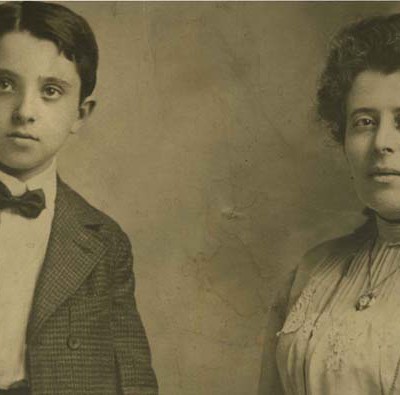
Joseph Ellovich (1836-1918) was born in Romania. His father was a Talmudic scholar. His mother sold cloth in a local market. The original surname of the family was “Ben Eli,” but was changed to Ellovich when members began immigrating to the United States.
Joseph was the gabbai (sexton) of the synagogue, which was a particularly important position because the synagogue did not have a full-time rabbi (although it did have a cantor with “a voice like Caruso’s,” as son Philip recalled in a 1969 oral history with the National Council of Jewish Woman, Pittsburgh Section).
He also owned a funeral decoration business, selling caskets and plumes to a primarily non-Jewish clientele. To avoid discrimination, he registered the business in the name of a non-Jewish partner. He later sold the business to the partner before leaving the country.
Through an arranged marriage, Joseph and his first wife had six children, Elias (c.1869-1928), Charles (1876-1946), Israel (1882-1936), Isidor (1884-1942), Deborah and Clara (1888-1964). In the early 1900s, the four older children immigrated to the United States.
After his first wife died, Joseph met Tillie Herman (1872-1951), an innkeeper’s daughter who was well educated and known as a talented dancer. Like Joseph, she also had a child from a previous marriage. Together, Joseph and Tillie had one child, Philip.
Joseph, Tillie, Clara and Philip immigrated to the United States about 1903. (Deborah was the principal of a Jewish gymnasium and remained in Romania.) According to a family story, one of the older brothers used connections in a fraternal order to ferry Joseph, Tillie and the two younger children by tugboat from their steamship to Hoboken, N.J., bypassing the traditional immigration points. The family lived briefly with family in Hartford, Connecticut, before settling in Pittsburgh, in the Hill District, where they also had family.
The family attended Oher Chodesh Congregation on Roberts Street, which was known colloquially as “The Romanian Shul.”
Philip Ellovich (1898-1986) attended the Franklin and Letsche schools. After two years at Fifth Avenue High School he took college entrance exams, which enabled his early admission to the University of Pittsburgh School of Pharmacy. He graduated in 1916, passed in state board examinations soon after and was so highly regarded that his classmates selected him to represent the student body at a dinner celebrating the 25th anniversary of the dean of the school.
Ellovich initially worked for his half-brother Israel “Joe” Ellovich at Forbes Pharmacy before spending a year with the May Drug Company, where he learned merchandising. Using a $2,000 loan from a relative, Barish Chamovitz, Ellovich opened a drug store inside a cigar shop in Coraopolis, but he soon dissolved the partnership after suspecting the shop owner of theft.
In the early 1920s, Philip Ellovich went into business with the owner of two Reznor Drug stores in Sharon, in Mercer County. In 1924, a recent high school graduate named Miriam Gross (1903-1989) applied for a clerk position. She and Philip began courting and married later that year. They had three children, Rosa, Joseph and Marcia. Philip and Miriam Ellovich were active in civic affairs, as well as in congregational life at the local Temple Beth Israel.
The Ellovich family raised funds during World War II to help European Jews escape Nazi Germany. Those refugees who came to Sharon often stayed with the Elloviches until they could find work and lodging. During these years, Philip Ellovich was the chairman of the Sharon branch of the Anti-Defamation League and of Israel Bonds and served as the president of his B’nai B’rith lodge and the regional division of the United Jewish Federation. In addition to his Jewish community work, he was a member of the Sharon Chamber of Commerce and the Community Fund, later known as the United Way. As president of the Association for a Better City in the 1950s, he tried to persuade national companies to build their regional distribution centers in Sharon.
Throughout his life, Philip regularly published articles about merchandizing for trade journals, including a one-act play called “Gross Becomes Net.” His partnership in the drugstore ended in the early 1950s. He maintained sole ownership until July 1976 when he sold the business and, with his wife, moved to Pittsburgh to be closer to their children.